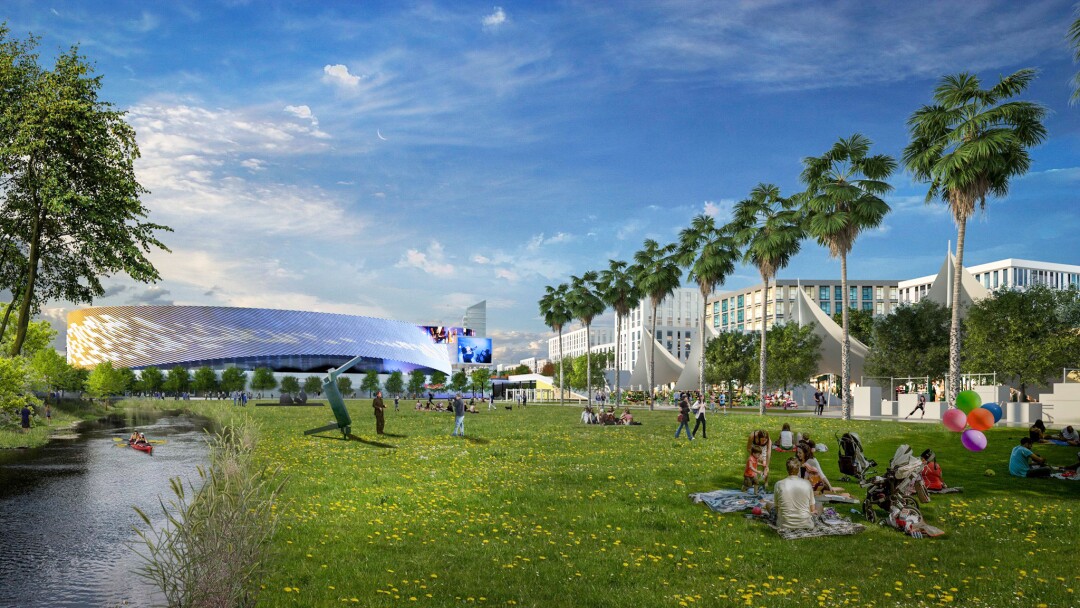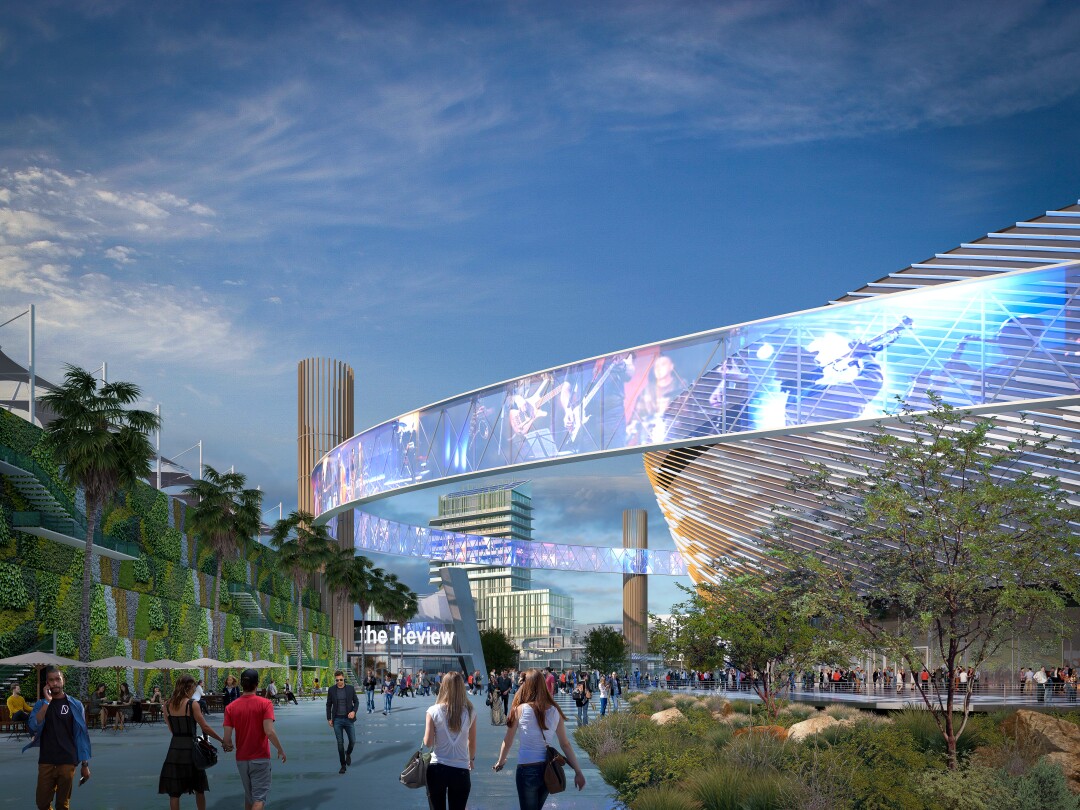
[ad_1]
The do-over opportunity to redevelop one of the largest masses of available real estate in town is shaping up to be the must-watch sporting event of the season as rival teams beef up their rosters and craft better playbooks. The game, a city-run competition for 48 acres of land around the sports arena in the Midway District, is going to be a long one — but that’s not stopping competitors from trying to elicit some early noise from the crowd.
Sunday, luxury housing builder Toll Brothers and partners mounted an official comeback campaign at a private event where community members were introduced to the thinking behind the freshly branded Midway Village+ plan.
This story is for subscribers
We offer subscribers exclusive access to our best journalism.
Thank you for your support.
The all-new strategy, which seeks to turn last year’s losing bid into a winning one, is centered around homes for people of varying income levels, a large park for everyone in the region to enjoy and a forever facility for the San Diego Loyal soccer team. It’s amplified by the addition of a ringer in the entertainment realm who has promised to build a new arena on its own dime.
The reveal comes less than two weeks after the city of San Diego advertised that the sports arena parcels were back on the market and days after Brookfield Properties said it was ready to make an offer.
“We’re aspiring to do something that can be emblematic of where the city is going,” said David Malmuth, a San Diego-based development consultant and Midway Village+ project executive. “The Midway District is a blighted area … . It sort of became the dumping ground for all the things that couldn’t go anyplace else — the strip clubs, the big box (stores) and the fast food. It’s one of the few places in San Diego where it feels like it could be Anywhere USA. Now there’s an opportunity to set a new standard.”
Newly released conceptual drawings and a site plan depict an expansive project, built in six phases that extends beyond the perimeter of the 48 acres currently on the market. It will cost untold billions, and probably require a lot of luck, to bring to life. Unlike last time, housing is at the heart of the plan.

The Midway Village+ development team envisions a 12-acre central park with a skate park, walking and biking baths, and a stream.
(Courtesy, McCullough Landscape Architecture and AVRP Studios)
There will be a “substantial increase” in the proposed number of housing units this time around, Malmuth said without disclosing the exact number because he doesn’t want the competition to know the breakdown yet.
Last year, Toll Brothers tried to win the site with a sports-and-entertainment-district vision that included just 1,400 housing units. The proposal was ultimately bested by a bid from Brookfield, which promised 2,100 units and won over city officials.
The 2020 matchup turned out to be more of a scrimmage.
The city’s process, a conventional request-for-proposal solicitation, was invalidated by California’s Department of Housing and Community Development. The agency, tasked with enforcing a newly revised Surplus Land Act, said San Diego should have, among other things, given affordable housing builders the first right of refusal. The city’s second attempt to unload its real estate holdings started on Oct. 4, when it published what’s called a “notice of availability,” alerting affordable housing developers registered with the state that it’s ready to lease its parcels at 3500, 3250, 3220 and 3240 Sports Arena Blvd.
Interested bidders must this time propose a redevelopment plan that includes at least 25 percent of proposed housing units set aside for lower-income families.
The Toll Brothers team will meet the threshold with help from Midway Village+ master developer Bridge Housing, which is working alongside MAAC. The duo is responsible for the project’s affordable units, reserved for families making 30 percent to 80 percent of the area’s median income. New team member Waterford Property Company, which specializes in middle-income housing, has signed on to produce apartments for households earning 80 percent to 120 percent of the area’s median income. Their collective contributions will make up half of all units on the site, Malmuth said.
The other half will be market-rate apartments. Toll Brothers is eyeing a cohesive neighborhood with buildings of varying size, shape and style thoughtfully scattered around the periphery of the site.
“At the start of the project, the plan is viewed as one large project, but as you move forward the plan becomes a mosaic of different pieces, including the market-rate housing,” said Michael McCann, who leads development and acquisition for Toll Brothers Southern California division. “We’ll ensure that the design and execution is specific to subparts of this project, and therefore appealing to a broad range of people. In other words, we will avoid at all cost one homogeneous set of market-rate apartments.”

A rendering of Midway Village+ shows the main entryway to the project’s proposed arena, which would be built and financed by Oak View Group. A separate event center and hotel are pictured in the background.
(Courtesy, McCullough Landscape Architecture and AVRP Studios)
In the center of Midway Village+, newly added master developer Oak View Group will build — and pay for out of pocket — a $450 million-or-more sports arena with 15,000 to 17,000 seats. Here the Los Angeles-based firm plans to book A-list entertainment acts year-round. The relatively young company, started six years ago by ex-AEG CEO Tim Leiweke and music mogul Irving Azoff, has already spent more than $5.5 billion in private capital on arena projects to date. Its first gamble, Climate Pledge Arena in Seattle, is set to open on Oct. 22 and will serve as the home of the National Hockey League’s newest expansion team, the Seattle Kraken.
“Our interest is really simple, we want to bring a new arena to San Diego. We don’t need any public subsidies. We’ll 100 percent, privately finance it. We will be carbon neutral from day one,” said Francesca Bodie, who is Oak View’s president of business development. “San Diego deserves a new, world-class arena that can drive the kind of content that the community would love to see on a regular basis.”
The plan also calls for a hotel, shops, restaurants, office space, a skate park, biking and pedestrian paths, and neighborhood schools. It even provides both a temporary and long-term home for the Loyal, San Diego’s USL Championship league soccer team. The club would start with a modular, 12,000 to 15,000-seat soccer stadium in phase one, but later move into a 20,000-seat, MLS-caliber venue on an adjacent, city-owned parcel that the Toll Brothers group would also like to lease.
“We view what we’re doing as having the opportunity, really the responsibility, to try to not just become an economic catalyst (for the Midway District), but to demonstrate how to do density in a way that creates beautiful public spaces, and a mix of uses that is much more pedestrian-friendly,” Malmuth said.
Toll Brothers, Bridge and Oak View, who will finance their respective portions of the project and also split costs associated with public amenities, have through Dec. 3 to respond to the city’s notice of availability. However, the due date is more of a starting point than a finish line; the city is required to negotiate for three months with all qualified responders.
San Diego officials have also said they plan to bring proposals before City Council members next year before selecting a winner. That means Toll Brothers and Brookfield will duel once again. The latter developer is also back with a reworked concept called Discover Midway that calls for a range of housing types, active parks and green space, and a reimagined arena. Another entity led by The ConAm Group, an apartment builder and property management company, has also entered the fray, although the specifics of its plan are not yet known.
It could be anybody’s game to win — or lose. Right now, there’s no scorecard that San Diego will use to evaluate proposals. The city must give priority to teams offering the greatest number of affordable units at the lowest average affordability level, and it has said it will only consider proposals with a new or refurbished arena.
[ad_2]
Source link